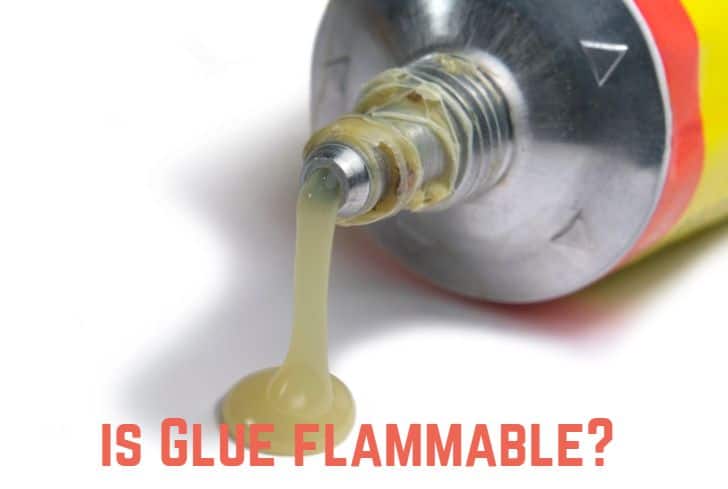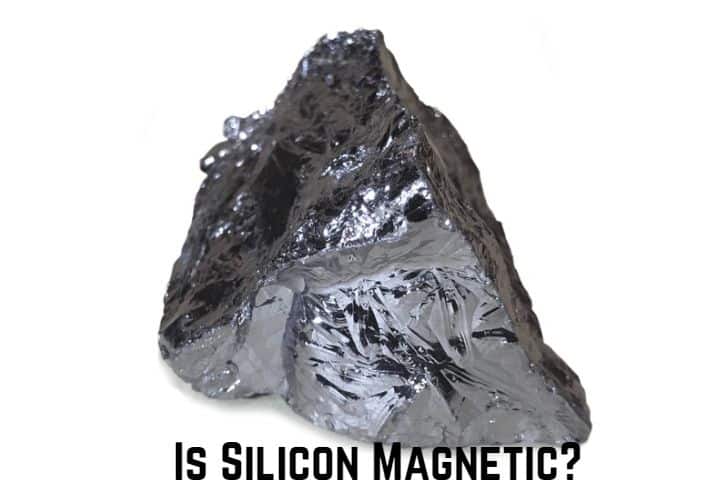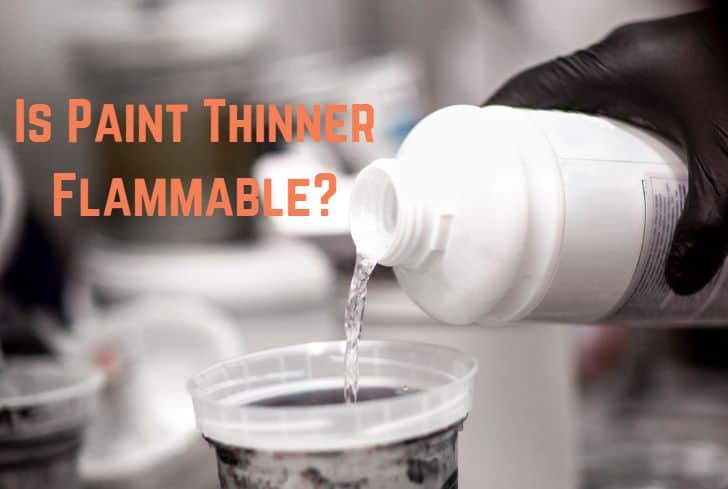Is Glue Flammable? (Answered)

Glue is one of the items that are most common in households. What would you do with all the DIY tasks and surfaces requiring binding? However, you still need to exercise caution when using glue. You must establish whether the glue you’re using is safe because of its numerous chemicals. Ask yourself, is glue flammable?
Is glue flammable is one of the essential questions we will answer in this article. We also let you know if the glue is flammable when wet, whether glue melts or burns, non-flammable glues, and how to tell whether the glue is flammable. Learn more about glues such as super glue, gorilla, Elmers, and nail glue.
Read: Is Lysol Flammable?
Is Glue Flammable?
Glue’s capacity to be flammable relies on its type and composition. Some glues are flammable(super glue), and others(white glue) are not. Vinyl acetate, a compound that quickly catches fire, makes up most of the glues. Acetic acid and acetylene react chemically to make vinyl acetate. But what makes glue flammable is whether it is water-based or dry.
All glues follow the same chemical processes, but they are mixed with other compounds to produce various types of glue for multiple uses. Water-based glues are not flammable, and you can only use them for small projects. One of the water-based glues is white craft glue. Even when wet, white craft glue is not flammable and child-friendly.
Is Glue Flammable When Wet?
Most glues are flammable when wet, although it also depends on the composition. Glues with high chemical and solvent content are more likely to catch fire when wet. The solvents are most active when the glue is wet and still liquid. Water-based glues are the only ones that don’t catch fire when wet.
Near an open flame, wet glues are likely to ignite. The solvents are no longer a fire hazard after the glues begin to dry. When it starts the process of drying, the wet glue produces flammable vapors.
Is Gorilla Glue Flammable?
The only time gorilla glue is not flammable is when it is dry. It easily ignites when the glue comes into contact with a heat source. If it ignites while wet, it emits harmful compounds like isocyanate vapor. Gorilla glue can resist high temperatures or heat from an open flame when dried.
Ensure the glue is not overheated because doing so will significantly reduce its bonding capacity.
Due to the harmful fumes from gorilla glue, avoid smoking nearby. The flammable contents of the glue have evaporated once it has dried, making it less combustible. The glue is powerful, and you can use it for challenging projects. It is considered a polyurethane-glue.
Is Super Glue Flammable?
Because of its high flammability, don’t use super glue in high temperatures. Additionally, keep it away from flames and other heat sources. It will quickly catch fire and ignite. Super glue is flammable, whether wet or dry. The glue is so flammable that it can ignite a cotton ball without a flame.
A moderate heat or an open flame can result from superglue and cotton reactions. Of course, it also depends on how much cotton and superglue you have. Chemical reactions between the two could result in minor burns.
Due to its potent fumes, you shouldn’t use super glue indoors. Use it in well-ventilated areas away from heat and open fires. Superglue melts and ignites at 368 °F (187 °C).
See how easily superglue can catch fire:
Is Super Glue Flammable When Dry?
Superglue is combustible and not flammable when it is dry. Dry superglue won’t burn when it is close to a flame but will burn if exposed to a direct flame for an extended period. Ethyl-2-cyanoacrylate is the primary flammable component of superglue and is only active when the glue is liquid.
As it dries, superglue has an exothermic reaction, generating heat throughout the drying process.
Read: Is Borax Flammable?
Is Elmer’s Glue Flammable?
Elmer’s glue is flammable but not quite as flammable as superglue. When dry, it is less flammable. Elmer is the ideal choice when you require glue that you can use in high temperatures because it has a considerably lower danger of igniting. It comes in two varieties. Due to its water-based composition, white Elmer glue is less flammable.
Elmer’s clear glue can catch fire, especially after it has dried out. When wet, the glue stick is highly combustible; when dry, not so much.
The benefit of Elmer’s glue in treating burn wounds is its most exciting feature. You won’t develop blisters, which will cool down your burning skin. However, you must proceed cautiously because medical professionals have not confirmed this.
Is Nail Glue Flammable?
Only when it is wet is nail glue flammable. However, the kind of nail glue you’re using also matters. Before approaching an open flame, ensure the nail glue is dry. Although not all nail glues are flammable, their chemical composition might release potentially harmful chemicals. Although it is flammable when close to flames, using it at high temperatures is safe.
However, cotton reacts when wet nail glue comes into contact with it and causes heat burns. However, you shouldn’t worry when using it because it becomes inflammable after drying. The TSA (Transport Security Administration) bans nail glue on all aircraft, demonstrating its flammability.
Does Glue Melt or Burn?
Glue melts and burns depending on its form. Liquid glues will burn in a flame, heat source, or extreme temperatures. Glue guns and sticks will first melt before burning. Low-temperature glue sticks have lower melting temperatures. That means it starts melting at 250°F(121°C). You have to use low-temperature glue sticks with low-temperature glue guns.
You can use low-temperature glue sticks on foam, thin films, plastics, fabric, or any other heat-sensitive material.
Thermoset-adhesives(glues) such as epoxy and polyester glues are other types that don’t require high temperatures to melt. When thermoset glues are used in joints, applying heat will cause the joints to come apart. Thermoset glues come in various varieties, including
- Uv curable glues.
- Cyanoacrylate glues.
- Polyurethane glues.
- Anaerobic glues.
Thermoplastic glues, however, melt at high temperatures and freeze at room temperature.
What Glue is Not Flammable?
Because they contain non-flammable solvents such as methylene chloride, non-flammable glues are not flammable. Although chloride is harmful to breathe, it is heavier than other solvents. Non-flammable glues dry faster than flammable ones. Highlighted below are several types of glue that are non-flammable.
Silicone Rubber Glue
Only in scorching temperatures can silicone rubber glue catch fire and burn. It is not flammable. The glue is perfect for sealing service penetrations, cladding panels, roofing, and wall connections.
The adhesive is high-expansion, all-weather, and fire-resistant. However, the glue is very susceptible to catching fire when combined with combustible solvents.
Hot glue
Hot glue is not flammable, whether it’s hot or dry. The glue lacks toxic chemicals, one of the reasons it is most preferred. However, it can be very irritating for someone who has respiratory problems.
Hot glue fumes can ignite depending on the following conditions:
- Quantity of glue.
- The glues temperature.
- The glue formulae.
- Previous heat history of the glue.
Pyrocol glue:
Water-based Pyrocol glues produce non-flammable films. The film offers fire protection for the surface you apply it to. Most people use it on calcium silicate boards, ceramic, glass wool, and plaster.
Wood glue:
Wood glue is not combustible or flammable. In general, using it in enclosed spaces is safe. Unless ingested, wood glue is non-toxic. You should mix it with little water. Polyvinyl acetate is another name for it.
White varieties of PVA wood glue are best indoors, while the yellow varieties(carpenter’s glue) are ideal outdoors.
School glue
Since most school glues are water-based and extinguish rather quickly, and they are not flammable. White glue, white paste, and glue sticks are good examples of non-toxic glues for kids. Because they are poisonous and flammable, glues with a strong solvent smell shouldn’t be used by children.
Water-based craft or white craft glue is widely used in homes and classrooms. In the event of a spill, it is not poisonous and is simple to clean up. The glue dries in a matter of minutes or less than an hour.
Here are some of the top school glues if you want some for your kids:
- Elmer’s Extra Strength Office Glue Sticks
- Avery Glue Sticks
- Elmer’s Disappearing Purple Glue Sticks
- Gorilla Glue Sticks
- Amazon Basics Glue Sticks
- Scotch Permanent Glue Stick
How to Tell if Glue Is Flammable or Not?
Sometimes it can be difficult to tell which glue is flammable and which is not. There may be options for flammable and non-flammable glues under certain brands. Checking a product’s label or the manufacturer’s material safety data sheet (MSDS) is the quickest way to determine whether a particular type of glue is flammable.
The glue is flammable if the MSDS lists a flash point for the glue is at or falls below 140° F (60° C).
Read: Is Olive Oil Flammable?
Conclusion
Although there are many types of glue, it is the most popular product in homes, schools, and workplaces. Knowing which type is flammable or not is difficult. You can, however, make a wise decision after reading the article.






